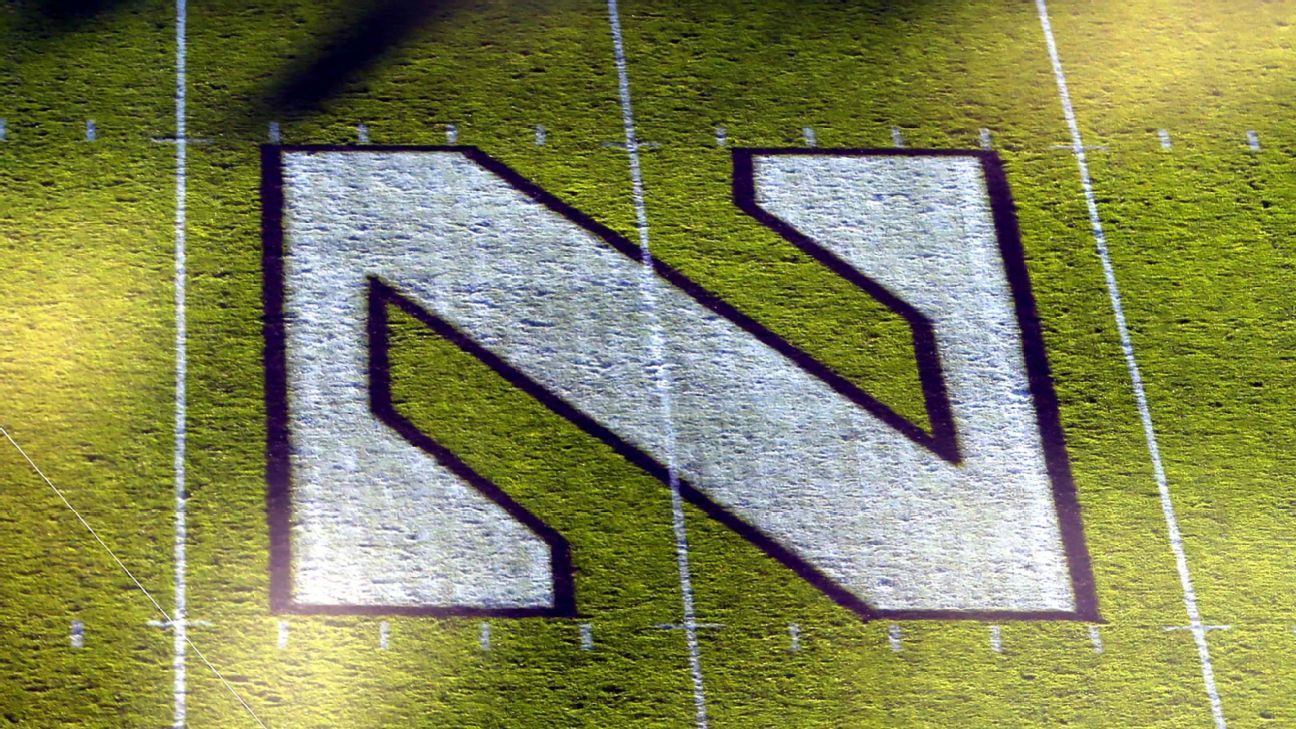Northwestern working to settle hazing lawsuits


Adam RittenbergApr 8, 2025, 10:53 AM ET
Northwestern is finalizing settlements with former athletes who filed hazing-related lawsuits against the university and former coach Pat Fitzgerald, whose $130 million wrongful termination lawsuit against the school is set to go to trial in November.
In a motion filed last week, requesting a continuation of the trial date in Fitzgerald’s claim, Northwestern stated it recently began mediation with the athletes that resulted in an undisclosed settlement currently being finalized. Northwestern said athlete plaintiffs “will be witnesses in the ongoing litigation” involving Fitzgerald.
“While the terms of the provisional settlement are confidential, we intend to continue to work through the remaining outstanding issues to finalize a settlement that will hopefully allow both sides to move forward in a positive way,” attorneys Patrick Salvi and Parker Stinar, who are representing some of the former football players, said in a statement.
Fitzgerald’s attorneys on Tuesday said Northwestern’s motion for continuation was denied, and that the trial date for his case remains set for Nov. 3. They have repeatedly requested earlier trial dates so that Fitzgerald, fired in July 2023 for cause, can return to coaching college football.
“Coach Fitzgerald committed no wrongdoing,” Fitzgerald’s attorneys Dan Webb and Matthew Carter said in a statement. “Despite extensive written and testimonial discovery, there remains no evidence to show or suggest that Coach Fitzgerald was aware of any hazing at Northwestern. The discovery has thus confirmed what Northwestern said through President Michael Schill both before and after Coach Fitzgerald’s termination: that there is no evidence that Coach Fitzgerald was aware of any hazing.”
Dozens of former athletes filed hazing-related lawsuits against Northwestern and Fitzgerald in 2023 and 2024. They cited sexualized acts and other troubling rituals that occurred during Northwestern’s preseason training camp and at other times.
In last week’s filing, Northwestern said that after repeated requests, attorneys representing the athletes responded Jan. 29, noting that 81 athletes had relevant information. Northwestern said it had conducted six depositions and has 33 more scheduled, and has identified 40 former athletes to be witnesses in its defense against Fitzgerald’s claim, as well as non-plaintiffs “identified as having information related to the hazing and other conduct in the football program during Fitzgerald’s tenure.”
The school requested the continuation so it could finish depositions with athletes and depositions or document requests with approximately 70 “third-party” individuals identified as having relevant information, including many who live outside of Illinois.
Northwestern fired Fitzgerald three days after announcing a two-week offseason suspension for the coach, following the completion of a university-commissioned investigation into allegations of hazing from a sole football player in late 2022. The investigation found that hazing had occurred in the program but that there was no evidence Fitzgerald knew about what had happened.
The player went public with his allegations to The Daily Northwestern and then ESPN, and Schill ultimately fired Fitzgerald amid significant backlash. Fitzgerald had led the program since 2006 as is Northwestern’s all-time winningest coach and a two-time national defensive player of the year at linebacker.
Fitzgerald filed his lawsuit in October 2023, claiming that Northwestern violated a verbal contract by firing him for cause, after agreeing to the suspension following the conclusion of its own investigation. He also claimed Northwestern and Schill violated his written contract. He’s seeking $68 million that remained on his contract, which ran through 2030, as well as future earnings losses of approximately $62 million. Fitzgerald has been a volunteer assistant for his son’s high school team but has not re-entered college coaching.
“Coach Fitzgerald has proven himself a staunch advocate of student well-being, including consistently emphasizing a zero-tolerance policy on hazing,” Webb and Carter’s statement reads. “He implemented and maintained some of the strongest anti-hazing programs and policies in collegiate sports.”
They added that every Northwestern player signed a hazing policy form before being allowed to practice, and that his actions to prevent hazing were “fully integrated” into the program.
“He continues to assert that Northwestern illegally terminated his employment, violated an oral contract, and defamed him, causing significant damage to his sterling reputation,” the attorney statement reads.
Former Northwestern offensive coordinator Mike Bajakian also sued the school for defamation and spreading false information in the wake of the hazing scandal. Bajakian’s case has been consolidated with Fitzgerald’s and also could go to trial. Bajakian spent the 2024 season at Utah and is currently offensive coordinator at Massachusetts.